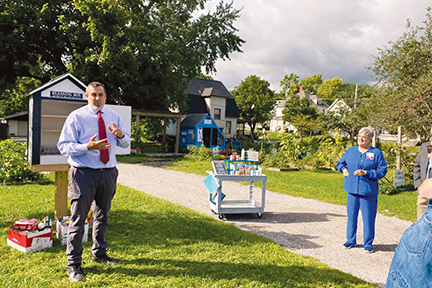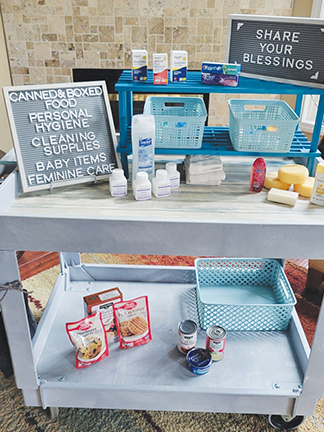By LISA EISENHAUER and KATHLEEN NELSON
It took a team to turn Laurie Camper's idea for erecting and stocking a little free pantry box near Mercy Health — St. Rita's Medical Center in Lima, Ohio, into reality. "I certainly could never have done this myself," says Camper, a registered nurse in the surgery department of the hospital.

Laurie Camper, at right, a registered nurse at Mercy Health — St. Rita's Medical Center in Lima, Ohio, listens to a speaker during the dedication of a blessing box at a community garden in September. The hospital installed the box at Camper's suggestion. Hospital employees donate nonperishable food, personal hygiene products and cleaning supplies that are free for the taking from the outdoor cupboard.
She says she was putting canned goods into a mini pantry, known as a blessing box, outside of her church on the outskirts of Lima when it dawned on her how needed a similar source of free nonperishable food, personal hygiene products and cleaning items was in the city proper.
"I thought to myself, 'This is real nice, people can stop here and get things, but we're maybe not very convenient to the Lima city people who need to have access to a blessing box and probably don't have very reliable transportation to get outside the city,'" Camper recalls.
St. Rita's is in the heart of Lima, a city of about 36,000 with a poverty rate of 24.2%, according to the U.S. Census Bureau. That is more than double the national rate of 11.6%.
Camper took her idea for installing a mini pantry box near St. Rita's to her manager, who shared it with others at the hospital. That led to the formation of a committee with representatives from various departments, including ministry, volunteer and marketing, to oversee and promote the project.
"Everybody reached out and did what part of the project they were good at and had contacts in and with everybody doing what they knew how to do, it pulled together absolutely perfectly," Camper says.
24-hour access
Ronda Lehman, president of Mercy Health — Lima, says because of community health needs assessments, "we know that food insecurity is a very real problem in many communities and, unfortunately, it's a very real problem in ours."

Departments at Mercy Health — St. Rita's Medical Center take turns donating supplies for the hospital's blessing box.
Lehman says Mercy Health — Lima, part of Bon Secours Mercy Health, works with food pantries and with organizations that try to improve access to high-quality food in food deserts, areas without a supermarket, green market or other convenient sources of fresh, affordable foods.
"This (blessing box) was just another outward sign and small way to be able to help people who are in need to have more secure food sources," Lehman says. Unlike food pantries, which have a much wider variety of products but are open at set times, the outdoor food boxes are accessible at all times.
At least two other Mercy Health hospitals in Ohio, Mercy Health — Anderson Hospital in Cincinnati and Mercy Health — Clermont Hospital in Batavia, have blessing boxes. Both of those were built and installed in partnership with a food pantry, but the stocking of contents is being handled solely by the hospitals.
Little food pantries have been springing up across the country. Their hyperlocal origin and focus make the scope of the pantries and their impact difficult to track. The largest clearinghouse for information on the mini pantry movement is Little Free Pantry, which lists more than 2,300 boxes on an interactive map on its website: littlefreepantry.org.
The website also provides blueprints for building the outdoor cupboards, as well as suggestions for identifying the best location for the pantries and keeping them stocked.
SSM Health joined a partnership on a project called Little Free Food Pantries with the United Way of South Central Illinois and the University of Illinois Extension service by providing funding to stock dry food staples and canned goods in the four pantries in its focus area in Marion and Jefferson counties. To strengthen community buy-in, Illinois Extension enlisted high schools and 4-H Clubs to build the boxes.
The partners support a pair of traditional food pantries and host a series of food giveaways organized as drive-thru markets staffed by volunteers. Plans call for a dozen little food pantries to be installed in the region.
Julie Robertson-Brooks, SSM Health's community health specialist in Southern Illinois, says the partners hope the local communities make the little free pantry program their own. "When you need it, you use it, and when you have the opportunity to give back, you put in supplies for the rest of the community."
Making giving, taking easy
The team from St. Rita's also cultivated community connection from the start, enlisting the help of a nearby trade school to design and build the first two boxes. In September the first blessing box was installed at a community garden about a block from the hospital. The second one will be located near another community garden.
To keep the mini pantries stocked, Camper created a cart with a list of needed items — canned and boxed foods, cleaning supplies and hygiene products. The cart rotates among departments at St. Rita's that have volunteered to fill it and transfer the supplies to the blessing box.
"I have so many generous and caring co-workers at St. Rita's who will do anything to help somebody else," she says. "The whole idea of this blessing box was let's help the community in any way that we can and let's make it easy for the employees to be able to do it."
Camper says that as soon as the box was in place and even before St. Rita's process for keeping it stocked got rolling, the box was filling up with goods. She credits "random people" in the community who were eager to help.
The goods are claimed from the box as quickly as they are supplied. After her father died last year, Camper and her brothers took a load of goods from his pantry to the blessing box. "Two days later I went back with a small box of additional things and almost everything that we had put in there was already gone," she says.
One of the features of the blessing box that Camper especially appreciates is its anonymity. People can claim as much as they want as often as they want without having to prove need. "Nobody says. 'Take only two things.' Nobody sets any rules," Camper says. "If you need it, you need it."